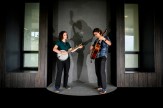Is Nicolas Cage a good actor? Experts weigh in on why the legendary actor’s work is so divisive
Known for swinging for the fences, Nicolas Cage pushes himself and audiences in a way that is rare for actors in today’s movie industry, Northeastern University acting teachers say.

There are few actors as well known and celebrated as Nicolas Cage. There are also few actors who are as mocked, memed and criticized as Cage.
The debate around Cage has persisted ever since he first made a name for himself in movies like “Raising Arizona,” “Moonstruck” and “Wild at Heart.” Is he a brilliant actor who fully commits to his roles or an over-actor who tends to go over the top? In other words, is Nicolas Cage a good actor or a bad actor?
It’s a question that comes up every time Cage appears in a movie, and the conversation around “Longlegs,” his recent horror movie, is no exception. It was even tackled in an episode of the sitcom “Community.”
Dennis Staroselsky, an assistant teaching professor of theater at Northeastern University and an actor whose credits include Kathryn Bigelow’s “Detroit” and HBO’s “The Deuce,” says the answer is clear: “He’s a wonderful actor.” But the divisive nature of his career is indicative of the norms of modern Hollywood –– and how much of an anomaly Cage really is.
“He takes risks, and for an actor of his stature, at his age to consistently be doing that is a rarity,” Staroselsky says. “What’s asked of us as artists is to take risks, and I’m not sure if … the movie industry mixes with that so well.”
Featured Posts
The very thing that some people criticize Cage for –– his bold, unsubtle choices in accent, vocal inflection or mannerisms –– is actually his superpower as a performer, Staroselsky says. When he takes on a role –– even in a small budget film of questionable quality that few people will see –– he fully commits.
Antonio Ocampo-Guzman, chair of Northeastern’s theater department and associate professor of theater, says Cage is the reason why “good” and “bad” are unhelpful terms when talking about acting or the arts in general.
“Acting, like many of the arts, is received by audiences in a very subjective way,” Ocampo-Guzman says. “A person’s performance might be really moving and captivating to one person and utterly repulsive to another. … To me, what’s important is whether a performance is compelling, as in captivating, as in moving, as in full of insight or intricacy.”
For an actor like Cage, who makes bold choices, it shouldn’t be surprising that his performances are either compelling or alienating, depending on the viewer.
The barometer for what is a compelling performance is different for every person, but it also depends on the genre and style of the movie in question. A heightened, operatic performance wouldn’t make sense in a grounded family drama, just like a more muted, “realistic” performance might feel out of place in a gonzo science fiction movie.
Staroselsky says Cage’s career is defined by his willingness to shift between genres and performance styles. He can go from wild-eyed, flamboyant performances in movies like “Vampire’s Kiss” to quiet understatement, most recently in “Pig.”
“What I think Cage is brilliant at, and what I try to teach and instill in my own work as an actor, is being aware of genre,” Staroselsky says. “That requires different volumes of thoughts and characterization.”
For fans, that unpredictability and versatility is part of Cage’s appeal, but in the current Hollywood landscape, it basically means he exists on his own planet, Staroselsky notes. In Hollywood, there are capital A actors like Meryl Streep and Daniel Day Lewis who take on transformative roles in prestige dramas and movie stars like George Clooney or Ryan Reynolds who more or less play a version of themselves in every movie.
Then there is Cage, who sits somewhere in the middle, which, Staroselsky says, can be confusing for audiences.
Part of the reason Cage is such a divisive performer might also come down to how prolific he is. With at least 116 acting credits to his name, Cage’s batting average as a performer is, inevitably, lower than his peers who might be more selective about the roles they take.
Cage’s constant creative output hasn’t always been self-motivated. He has been candid about the financial troubles (and bizarre purchases) that led him to take on roles in a slew of direct-to-video movies in the 2000s. Cage’s reputation comes just as much from the struggle inherent in trying to have a lasting career as an actor, says Ocampo-Guzman.
“When he first came onto the scene, he was considered for his hot blooded, visceral, intense performances on film,” Ocampo-Guzman says. “But then to sustain a career in that market, people do a variety of bizarre things, and then the perception of the audience shifts with time.”
But the sheer amount of work he takes on has also given Cage the chance to take risks in a way that many of his Hollywood peers don’t. Staroselsky says it’s something actors and audiences alike should learn from, not criticize.
“He’s constantly working, he’s constantly challenging himself in one way or another,” Staroselsky says “Are they all hits? No, but I think there’s something admirable about a guy who’s made his money and he’s [acting] to explore, to take a risk, and he’s willing to fall flat on his face, as he has.”
Whether audiences and critics agree, the fact that Cage, at 60, feels like he is doing the best work of his career, is a testament to an artist who has never stopped pushing himself creatively. Staroselsky sees Cage’s “campy and kind of out there” performance in “Longlegs” as further proof of how confoundingly compelling the actor can be.
“I don’t know what it is about Nic Cage that gets that spark going [for people], but yeah, he’s weird, he’s wacky and he’s 100 percent bought in,” Staroselsky says. “I don’t know too many actors who hit in their 20s or 30s that are stretching themselves in their 50s or 60s.”











